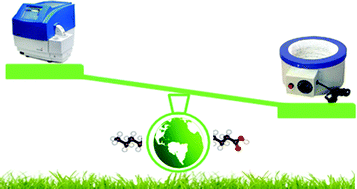Jonathan Moseley and Oliver Kappe provide some pertinent answers to the question: “Why should microwave chemistry be green?”.
There has been over 5000 microwave-assisted syntheses reported in the last 25 years and most of the scientific reports assume that microwave reactions are green, sustainable, environmentally friendly (“ecofriendly”), benign etc. A lot of the times, authors do not provide a clear rationalization and justification why the respective protocols are green because most researchers assume that microwave heating is more energy efficient than classical heating methods.
Here, Moseley and Kappe critically assess the energy efficiency of microwave-assisted transformations in the context of scaling-up this technology to production quantities, taking into account the twelve principles of green chemistry, with a focus on the 6th principle: design for energy efficiency.
“Microwave heating process performed in laboratory-scale single-mode microwave reactors is appallingly energy inefficient,” claim Moseley and Kappe.
However, they agree that when moving from the lab scale to the kilogram scale, microwave technology is more efficient that conventional heating processes.
The full perspective can be freely downloaded until the 3rd April 2011.
A critical assessment of the greenness and energy efficiency of microwave-assisted organic synthesis
Jonathan D. Moseley and C. Oliver Kappe
Green Chem., 2011, Advance Article
DOI: 10.1039/C0GC00823K, Perspective
This perspective has also been highlighted in Chemistry World. It can be read here:











